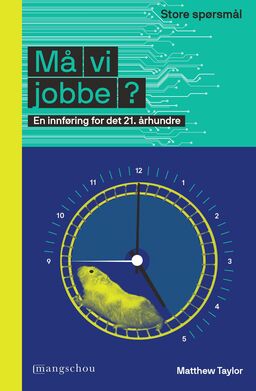
Må vi jobbe? : en innføring for det 21. århundret
Matthew Taylor ; oversatt av Inger Sverreson HolmesLedig
- Automatlager: 1 av 1 ledig
Henter eksemplarliste...
Fakta
Laster innhold...
Kopiér til utklippstavle
*0012227137 *00520231019103951.0 *007ta *008230613s2023 no b e 0 0 nob *00905719cam a2200553 c 4500 *019 $bl *020 $a978-82-8238-267-0$cNkr 279.00$qheftet *035 $a(EXLNZ-47BIBSYS_NETWORK)999922193275502201 *035 $a(NO-DIMO)de19338c-c0dc-4658-a19c-4d53c1654667 *035 $a(NO-LaBS)21307990(bibid) *035 $a(NO-OsBA)0688560 *035 $a(NO-OsBAS)150466022 *035 $aoai:bibbi.bs.no:0688560 *035 $aoai:nb.no:pliktmonografi_000024080 *035 $aoai:nb.no:pliktmonografi_000024080 *040 $aNO-OsBA$bnob$erda$dNO-OsNB *0411 $anob$heng *05000$aHD4904 *08204$a331.01$qNO-OsBA$223/nor/20230803 *0830 $a331.01$qUK-StDuBDS$223 *1001 $aTaylor, Matthew$d1960-$0(NO-TrBIB)1642068491169$4aut$_179250300 *24010$aDo we have to work?$lNorsk$_242869400 *24510$aMå vi jobbe?$ben innføring for det 21. århundret$cMatthew Taylor ; oversatt av Inger Sverreson Holmes *24622$aDo we have to work?$ba primer for the Twentyfirst Century *24633$aDo we have to work?$ba primer for the 21st century *263 $a230802 *264 1$aBergen$bMangschou$c2023 *300 $a143 sider$billustrasjoner i farger, kart *336 $atekst$0http://rdaregistry.info/termList/RDAContentType/1020$2rdaco *337 $auformidlet$0http://rdaregistry.info/termList/RDAMediaType/1007$2rdamt *338 $abind$0http://rdaregistry.info/termList/RDACarrierType/1049$2rdact *4901 $aStore spørsmål *500 $aPå tittelsiden: Over 190 illustrasjoner *5050 $gIntroduksjon. -$g1,:$tHva er arbeid, og hvorfor arbeider vi? .-$g82.:$tHva var arbeid før, og hva er det nå?.-$g3.:$tDet utilfredstillende artbeidet, -$g4,:$tKonklusjon. -$gVidere lesning. -$gBildekreditering. -$gRegister.-$gTakk til : *520 $aKlimakrisen, kunstig intelligens og trusselen om nye pandemier tvinger oss til å tenke annerledes om hvordan vi jobber. Forfatter Matthew Taylor hevder vi med noen grunnleggende grep kan forvandle arbeid fra å være en byrde til et middel til å leve best mulig sammen.$cForleggeropplysninger (Mangschou) *520 $aKlimakrisen, store teknologiske endringer og koronapandemien har forandret måtene vi jobber på over hele verden og presset frem et behov for å tenke radikalt annerledes om hvordan og hvorfor vi jobber. Kan produktiviteten økes i det uendelige, eller er det på tide å ta et skritt til siden? Vil utviklingen av kunstig intelligens lede til massearbeidsledighet eller en postkapitalistisk utopi? Burde vi innføre en form for borgerlønn? Denne boka ser på hvordan arbeidets betydning, status og struktur har forandre seg over tid og hvordan en ny arbeidsepoke kan arte seg. Forfatteren hevder at vi med noen grunnleggende endringer kan forvandle arbeid fra å være en byrde som pålegges oss til rett og slett å bli et middel til å leve best mulig sammen. Matthew Taylor ledet en utredning av arbeidets fremtid for den britiske statsministeren Theresa May. I en tid der uttrykk som "bullshit jobs" og "quiet quitting" har blitt allemannseie, viser han hvordan vi kan tenke nytt om hvordan og hvorfor vi skal jobbe i fremtiden.$cForleggeromtale og BS- Biblioteksentralen *520 $aWork allows us to pay the bills. The practical and conceptual divide between work and leisure profoundly shapes our lives. Work is where many of us derive our status and our sense of purpose. Work is so much part of our lives and our culture that we have internalized beliefs about its value and have built our economies and lives around those beliefs. This book reviews how the meaning, status and structure of work have changed across history and cultures. Amidst the Covid-19 crisis, the growth of AI and the climate emergency, it questions the need for the 'growth escalator', in which society relies on continuous growth to flourish, and suggests that we should find ways to step off or at least slow down the 'hedonic treadmill', in which we crave ever more goods only to tire of them ever more quickly. This book posits that we are approaching a new era of work. It outlines some of the factors that might lead to change, including the adoption of forms of universal basic income, the growth of the zero- or low-cost economy (renewable energy, user-generated content, community mutual support), and the growth of self-employment and quasi-autonomous ways of working (including from home) in organizations. It concludes that such changes might foster a more fundamental shift: a growing intolerance to the idea of work as a burden and a desire to transform it from something imposed on us into simply the means by which we live our best lives together, recreating in modern conditions with modern resources, a prehistoric unity between being and working.$cForleggeropplysninger (Thames & Hudson) *650 7$aArbeidsliv$0(No-TrBIB)HUME09123$2humord$_243869900 *650 7$aArbeidsliv$xFilosofi og teori$0(NO-OsBA)1136608$2bibbi$9nno$_185764200 *650 7$aArbeidsliv$xFilosofi og teori$0(NO-OsBA)1136608$2bibbi$9nob$_185764300 *650 7$aLabor$xPhilosophy.$0(OCoLC)fst00989822$2fast$_246743500 *7001 $aHolmes, Inger Sverreson$d1962-$0(NO-TrBIB)10000241$4trl$_11042100 *7001 $aTaylor, Matthew$d1960-$0(NO-TrBIB)1642068491169$iOversettelse av:$tDo we have to work?$lEngelsk$_179250300 *7001 $aTaylor, Matthew$d1960-$0(NO-TrBIB)1642068491169$tDo we have to work?$lNorsk$_179250300 *830 0$aBig idea$lNorsk$_242869600 *85640$uhttps://urn.nb.no/URN:NBN:no-nb_pliktmonografi_000024080$3Fulltekst$yNettbiblioteket$zDigital representasjon *85642$3Forlagets beskrivelse (lang)$uhttps://contents.bibs.aws.unit.no/content/?isbn=9788282382670 *85642$amangschou.com$3Forlagets beskrivelse (kort)$uhttp://www.mangschou.no/netthandel/products/ma-vi-jobbe$qtext/html *913 $aNorbok$bNB *999 $aoai:nb.bibsys.no:999920424200902202$b2023-08-09T09:42:17Z$z999920424200902202 ^